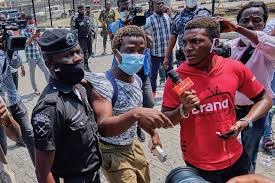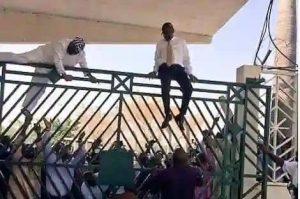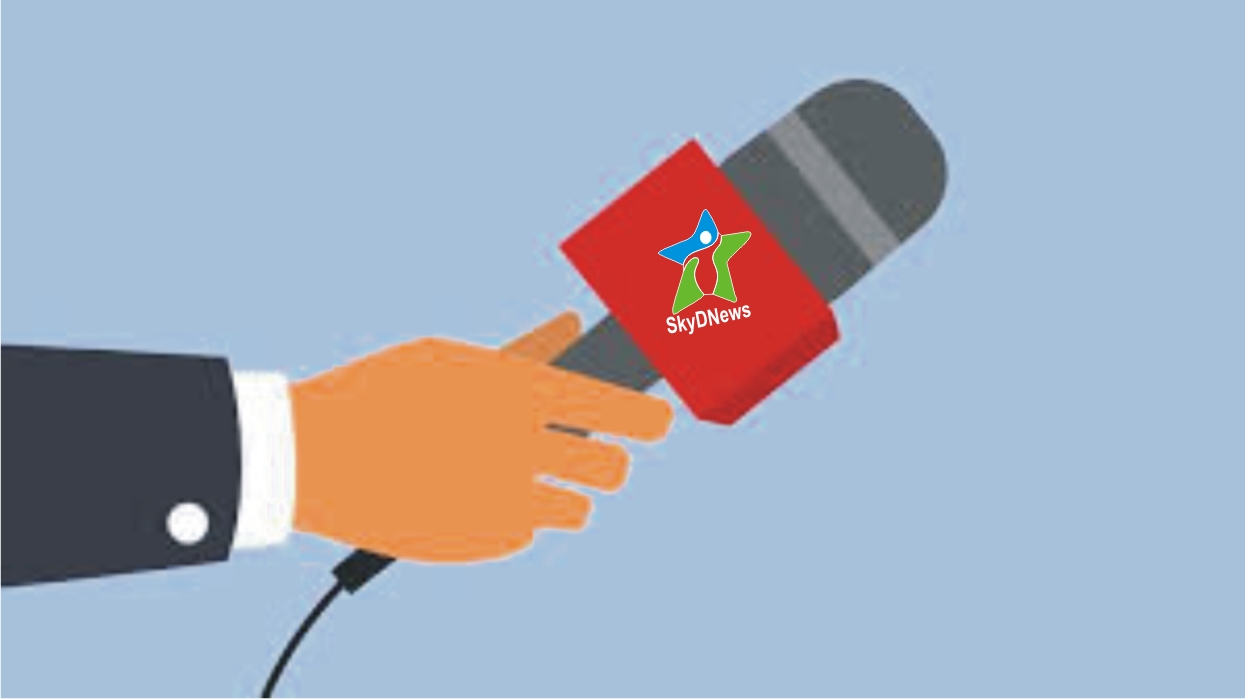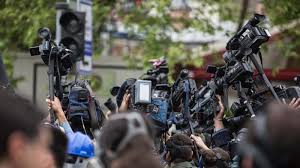Journalism in Nigeria is a profession fraught with challenges, where the dual threats of digital and physical insecurity loom large. The landscape for Nigerian journalists is complex, shaped by political, economic, and social forces that often compromise their safety. With the advent of digital platforms and the persistence of traditional risks such as harassment and violence, journalists must now navigate a dangerous intersection where physical and digital safety are equally critical.
Ensuring the safety of Nigerian journalists in this environment is not just about protecting individuals but safeguarding press freedom and democracy itself. As renowned media expert, John N. Panton, once noted,
“A nation’s commitment to the truth can be measured by how safe its journalists feel when reporting it.” The Nigerian press plays a pivotal role in holding power accountable, exposing corruption, and amplifying the voices of marginalized groups. Protecting journalists - both online and offline - is essential for preserving these democratic functions.
Physical Safety in Nigerian Journalism
In Nigeria, the physical dangers faced by journalists are stark and well-documented. From 1992 to 2023, the Committee to Protect Journalists (CPJ) reported 13 journalists killed in the country, while many more have faced threats, harassment, and intimidation. Political tensions, ethnic clashes, insurgencies, and civil unrest create volatile environments where journalists are often caught in the crossfire.
A major challenge arises when journalists report on politically sensitive topics such as corruption, election malpractice, or militant activities. For instance, the 2020 #EndSARS protests, which began as a peaceful movement against police brutality, exposed the severe risks journalists face when covering civil unrest. During the protests, several journalists were arrested, assaulted, or had their equipment confiscated by security forces. The brutality and impunity demonstrated against these reporters sent a chilling message across the profession.
“The physical safety of journalists is under constant threat in Nigeria, especially those investigating corruption or reporting on civil unrest. The weaponization of the law, alongside physical attacks, has created an environment where journalists have to look over their shoulders even while doing their jobs,” says Angela Quintal, Africa Programme Coordinator at CPJ.
 Key Challenges to Physical Safety:
State Persecution:
Key Challenges to Physical Safety:
State Persecution: In Nigeria, journalists often find themselves at odds with state authorities. Investigative reporting or coverage of controversial political events can lead to arrests or violence at the hands of security operatives. This was notably the case with Agba Jalingo, a Nigerian journalist and publisher, who was detained and charged with treason for his reporting on alleged corruption by the Cross River State government.
Harassment from Non-State Actors: Journalists also face threats from militant groups, criminal organizations, and powerful individuals outside the formal political system. Reporting on conflicts involving Boko Haram, for example, has led to several kidnappings and killings of journalists.
Violence during Protests: Journalists covering protests and civil demonstrations face high levels of risk, as seen during the #EndSARS protests. Police and military forces often fail to distinguish between protestors and reporters, using force indiscriminately. Reporters are beaten, arrested, or have their cameras and phones confiscated.
Digital Safety in Nigerian Journalism
While physical safety remains a pressing concern, the rise of digital threats has added a new dimension to the dangers Nigerian journalists face. With the growth of online journalism, social media platforms, and digital activism, Nigerian journalists are increasingly vulnerable to hacking, surveillance, harassment, and disinformation campaigns. These threats undermine the integrity of journalism and can have serious consequences for the personal safety and professional credibility of reporters.
As Maria Ressa, the award-winning Filipino journalist, warned,
“Online attacks on journalists are the new frontline in the battle for truth.” In Nigeria, this battle is especially pronounced, with journalists being targeted by both state-sponsored and independent digital actors.
Key Challenges to Digital Safety:
Surveillance and Hacking: Nigerian journalists are at risk of surveillance, with state actors and other entities employing digital tools to monitor their communications. For example, the use of spyware like Pegasus by governments worldwide to target journalists highlights the extent of this threat. In Nigeria, journalists investigating high-level corruption or insurgencies have reported suspicious activities on their devices, with some experiencing hacking attempts on their emails and social media accounts.
Doxxing and Online Harassment: Doxxing - publicly releasing personal information with malicious intent - has become a tactic to silence journalists in Nigeria. In many cases, journalists who report on sensitive topics such as political corruption or human rights abuses are subjected to coordinated online harassment. This harassment can take the form of death threats, cyberstalking, and damaging disinformation aimed at tarnishing their reputation.
Disinformation and Fake News: Disinformation campaigns are another critical digital threat. In Nigeria’s polarized political climate, journalists are frequently targeted by fake news campaigns designed to discredit their work. These campaigns are often orchestrated by politically affiliated actors who seek to muddy the waters of public discourse, making it difficult for audiences to distinguish between genuine and false reporting.
 Strategies for Ensuring Journalist Safety
Strategies for Ensuring Journalist Safety
Given these escalating risks, Nigerian journalists must adopt comprehensive safety strategies that encompass both physical and digital aspects. Here are a few actionable strategies:
Security Training: Journalists must receive training on personal security measures, especially when covering high-risk events like protests or conflict zones. In 2019, UNESCO launched a safety guide for journalists, which emphasized the need for training on how to safely navigate hostile environments. Nigerian journalists should seek out similar resources and training programs to better equip themselves.
Digital Hygiene Practices: Given the rise of digital threats, Nigerian journalists must adopt robust cybersecurity practices. This includes using encrypted communication tools such as Signal, regularly updating their software to avoid malware, and utilizing strong passwords and two-factor authentication (2FA) on their devices and accounts. Investigative journalists working on sensitive topics should also consider using a VPN to protect their online activities from surveillance.
Legal Support Networks: Legal threats are common in Nigeria, and journalists facing arrest or persecution often have little recourse without strong legal support. Journalists should establish connections with legal advocacy organizations like the Media Rights Agenda (MRA) or the Nigerian Union of Journalists (NUJ), which offer legal advice and protection for reporters facing litigation or state persecution.
Support from International Organizations: Global organizations such as the Committee to Protect Journalists (CPJ), Reporters Without Borders, and Amnesty International provide crucial support for Nigerian journalists at risk. These groups can apply international pressure on the Nigerian government when journalists are unjustly detained or attacked, as well as provide emergency funding or relocation assistance for journalists in imminent danger.
 Conclusion
Conclusion
The dual threats of physical and digital insecurity in the Nigerian journalism space are not just individual challenges but broader threats to press freedom and democracy. The safety of Nigerian journalists directly impacts their ability to report on critical issues such as corruption, human rights abuses, and political unrest.
As Nigerian journalist Dapo Olorunyomi, founder of Premium Times, poignantly put it,
“A society that fails to protect its journalists from harm is one that is unable to protect its own freedom.”
It is incumbent upon the Nigerian government, civil society organizations, and the international community to take decisive action in protecting journalists and ensuring their safety in both the physical and digital realms. Journalists themselves must continue to adapt and fortify their safety strategies to meet the evolving challenges of this perilous but indispensable profession.
 Key Challenges to Physical Safety:
State Persecution: In Nigeria, journalists often find themselves at odds with state authorities. Investigative reporting or coverage of controversial political events can lead to arrests or violence at the hands of security operatives. This was notably the case with Agba Jalingo, a Nigerian journalist and publisher, who was detained and charged with treason for his reporting on alleged corruption by the Cross River State government.
Harassment from Non-State Actors: Journalists also face threats from militant groups, criminal organizations, and powerful individuals outside the formal political system. Reporting on conflicts involving Boko Haram, for example, has led to several kidnappings and killings of journalists.
Violence during Protests: Journalists covering protests and civil demonstrations face high levels of risk, as seen during the #EndSARS protests. Police and military forces often fail to distinguish between protestors and reporters, using force indiscriminately. Reporters are beaten, arrested, or have their cameras and phones confiscated.
Digital Safety in Nigerian Journalism
While physical safety remains a pressing concern, the rise of digital threats has added a new dimension to the dangers Nigerian journalists face. With the growth of online journalism, social media platforms, and digital activism, Nigerian journalists are increasingly vulnerable to hacking, surveillance, harassment, and disinformation campaigns. These threats undermine the integrity of journalism and can have serious consequences for the personal safety and professional credibility of reporters.
As Maria Ressa, the award-winning Filipino journalist, warned, “Online attacks on journalists are the new frontline in the battle for truth.” In Nigeria, this battle is especially pronounced, with journalists being targeted by both state-sponsored and independent digital actors.
Key Challenges to Digital Safety:
Surveillance and Hacking: Nigerian journalists are at risk of surveillance, with state actors and other entities employing digital tools to monitor their communications. For example, the use of spyware like Pegasus by governments worldwide to target journalists highlights the extent of this threat. In Nigeria, journalists investigating high-level corruption or insurgencies have reported suspicious activities on their devices, with some experiencing hacking attempts on their emails and social media accounts.
Doxxing and Online Harassment: Doxxing - publicly releasing personal information with malicious intent - has become a tactic to silence journalists in Nigeria. In many cases, journalists who report on sensitive topics such as political corruption or human rights abuses are subjected to coordinated online harassment. This harassment can take the form of death threats, cyberstalking, and damaging disinformation aimed at tarnishing their reputation.
Disinformation and Fake News: Disinformation campaigns are another critical digital threat. In Nigeria’s polarized political climate, journalists are frequently targeted by fake news campaigns designed to discredit their work. These campaigns are often orchestrated by politically affiliated actors who seek to muddy the waters of public discourse, making it difficult for audiences to distinguish between genuine and false reporting.
Key Challenges to Physical Safety:
State Persecution: In Nigeria, journalists often find themselves at odds with state authorities. Investigative reporting or coverage of controversial political events can lead to arrests or violence at the hands of security operatives. This was notably the case with Agba Jalingo, a Nigerian journalist and publisher, who was detained and charged with treason for his reporting on alleged corruption by the Cross River State government.
Harassment from Non-State Actors: Journalists also face threats from militant groups, criminal organizations, and powerful individuals outside the formal political system. Reporting on conflicts involving Boko Haram, for example, has led to several kidnappings and killings of journalists.
Violence during Protests: Journalists covering protests and civil demonstrations face high levels of risk, as seen during the #EndSARS protests. Police and military forces often fail to distinguish between protestors and reporters, using force indiscriminately. Reporters are beaten, arrested, or have their cameras and phones confiscated.
Digital Safety in Nigerian Journalism
While physical safety remains a pressing concern, the rise of digital threats has added a new dimension to the dangers Nigerian journalists face. With the growth of online journalism, social media platforms, and digital activism, Nigerian journalists are increasingly vulnerable to hacking, surveillance, harassment, and disinformation campaigns. These threats undermine the integrity of journalism and can have serious consequences for the personal safety and professional credibility of reporters.
As Maria Ressa, the award-winning Filipino journalist, warned, “Online attacks on journalists are the new frontline in the battle for truth.” In Nigeria, this battle is especially pronounced, with journalists being targeted by both state-sponsored and independent digital actors.
Key Challenges to Digital Safety:
Surveillance and Hacking: Nigerian journalists are at risk of surveillance, with state actors and other entities employing digital tools to monitor their communications. For example, the use of spyware like Pegasus by governments worldwide to target journalists highlights the extent of this threat. In Nigeria, journalists investigating high-level corruption or insurgencies have reported suspicious activities on their devices, with some experiencing hacking attempts on their emails and social media accounts.
Doxxing and Online Harassment: Doxxing - publicly releasing personal information with malicious intent - has become a tactic to silence journalists in Nigeria. In many cases, journalists who report on sensitive topics such as political corruption or human rights abuses are subjected to coordinated online harassment. This harassment can take the form of death threats, cyberstalking, and damaging disinformation aimed at tarnishing their reputation.
Disinformation and Fake News: Disinformation campaigns are another critical digital threat. In Nigeria’s polarized political climate, journalists are frequently targeted by fake news campaigns designed to discredit their work. These campaigns are often orchestrated by politically affiliated actors who seek to muddy the waters of public discourse, making it difficult for audiences to distinguish between genuine and false reporting.
 Strategies for Ensuring Journalist Safety
Given these escalating risks, Nigerian journalists must adopt comprehensive safety strategies that encompass both physical and digital aspects. Here are a few actionable strategies:
Security Training: Journalists must receive training on personal security measures, especially when covering high-risk events like protests or conflict zones. In 2019, UNESCO launched a safety guide for journalists, which emphasized the need for training on how to safely navigate hostile environments. Nigerian journalists should seek out similar resources and training programs to better equip themselves.
Digital Hygiene Practices: Given the rise of digital threats, Nigerian journalists must adopt robust cybersecurity practices. This includes using encrypted communication tools such as Signal, regularly updating their software to avoid malware, and utilizing strong passwords and two-factor authentication (2FA) on their devices and accounts. Investigative journalists working on sensitive topics should also consider using a VPN to protect their online activities from surveillance.
Legal Support Networks: Legal threats are common in Nigeria, and journalists facing arrest or persecution often have little recourse without strong legal support. Journalists should establish connections with legal advocacy organizations like the Media Rights Agenda (MRA) or the Nigerian Union of Journalists (NUJ), which offer legal advice and protection for reporters facing litigation or state persecution.
Support from International Organizations: Global organizations such as the Committee to Protect Journalists (CPJ), Reporters Without Borders, and Amnesty International provide crucial support for Nigerian journalists at risk. These groups can apply international pressure on the Nigerian government when journalists are unjustly detained or attacked, as well as provide emergency funding or relocation assistance for journalists in imminent danger.
Strategies for Ensuring Journalist Safety
Given these escalating risks, Nigerian journalists must adopt comprehensive safety strategies that encompass both physical and digital aspects. Here are a few actionable strategies:
Security Training: Journalists must receive training on personal security measures, especially when covering high-risk events like protests or conflict zones. In 2019, UNESCO launched a safety guide for journalists, which emphasized the need for training on how to safely navigate hostile environments. Nigerian journalists should seek out similar resources and training programs to better equip themselves.
Digital Hygiene Practices: Given the rise of digital threats, Nigerian journalists must adopt robust cybersecurity practices. This includes using encrypted communication tools such as Signal, regularly updating their software to avoid malware, and utilizing strong passwords and two-factor authentication (2FA) on their devices and accounts. Investigative journalists working on sensitive topics should also consider using a VPN to protect their online activities from surveillance.
Legal Support Networks: Legal threats are common in Nigeria, and journalists facing arrest or persecution often have little recourse without strong legal support. Journalists should establish connections with legal advocacy organizations like the Media Rights Agenda (MRA) or the Nigerian Union of Journalists (NUJ), which offer legal advice and protection for reporters facing litigation or state persecution.
Support from International Organizations: Global organizations such as the Committee to Protect Journalists (CPJ), Reporters Without Borders, and Amnesty International provide crucial support for Nigerian journalists at risk. These groups can apply international pressure on the Nigerian government when journalists are unjustly detained or attacked, as well as provide emergency funding or relocation assistance for journalists in imminent danger.
 Conclusion
The dual threats of physical and digital insecurity in the Nigerian journalism space are not just individual challenges but broader threats to press freedom and democracy. The safety of Nigerian journalists directly impacts their ability to report on critical issues such as corruption, human rights abuses, and political unrest.
As Nigerian journalist Dapo Olorunyomi, founder of Premium Times, poignantly put it, “A society that fails to protect its journalists from harm is one that is unable to protect its own freedom.”
It is incumbent upon the Nigerian government, civil society organizations, and the international community to take decisive action in protecting journalists and ensuring their safety in both the physical and digital realms. Journalists themselves must continue to adapt and fortify their safety strategies to meet the evolving challenges of this perilous but indispensable profession.
Conclusion
The dual threats of physical and digital insecurity in the Nigerian journalism space are not just individual challenges but broader threats to press freedom and democracy. The safety of Nigerian journalists directly impacts their ability to report on critical issues such as corruption, human rights abuses, and political unrest.
As Nigerian journalist Dapo Olorunyomi, founder of Premium Times, poignantly put it, “A society that fails to protect its journalists from harm is one that is unable to protect its own freedom.”
It is incumbent upon the Nigerian government, civil society organizations, and the international community to take decisive action in protecting journalists and ensuring their safety in both the physical and digital realms. Journalists themselves must continue to adapt and fortify their safety strategies to meet the evolving challenges of this perilous but indispensable profession. 
